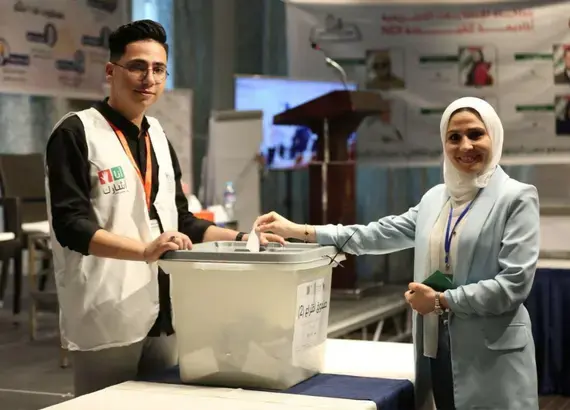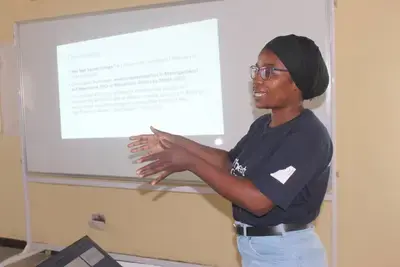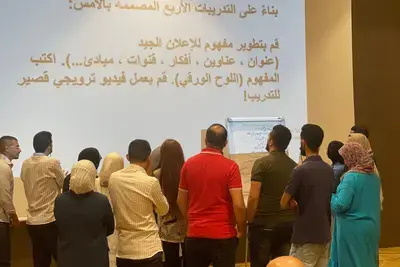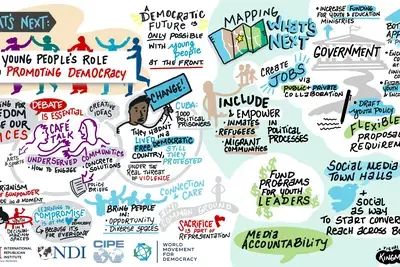
Success Story
Young Palestinians Continue to Hone their Leadership Abilities
In recent years, particularly in the wake of COVID, the political and economic environments of the West Bank and Gaza (WBG) have generally deteriorated, exacerbated by continued conflict with Israel, little opportunity for political competition and limited venues for civic activity. However, despite this, Palestinians remain supportive of democracy, with the 2021-2022 Arab Barometer indicating that 70 percent of Palestinians believe democratic governments are better than alternative forms of government. The National Democratic Institute (NDI) has witnessed this enthusiasm in its programming in WBG.
To capitalize on this interest in democracy and democratic principles, NDI has a suite of youth advocacy and education programs in WBG. This suite includes Ana Usharek, Usharek+ and Ana Usharek-Community, all of which focus on providing WBG youth, students and community members with an avenue to learn and utilize civic skills and tools. Each program targets a different demographic; Ana Usharek, a semester-long program, is designed to educate university students across NDI’s ten partner universities in WBG. Usharek+, a year-long program, allows former Ana Usharek students who excelled in the program to advance their civic education journey, giving them opportunities to pursue more tangible civic engagement, such as developing their own advocacy campaigns. Ana Usharek-Community, which runs during the summer, utilizes the Ana Usharek curriculum and allows Palestinian youth and community members to learn about civic skills and democratic principles.
A key aspect of NDI’s on-the-ground work is its Leadership Academy (Academy), an innovative program that trains a select group of young Palestinians. This year's Leadership Academy was the second iteration of the programming, and interest in the program was remarkably high. After an arduous selection process, NDI selected 23 young professionals between the ages of 28 and 40 from the West Bank, East Jerusalem and Gaza from a pool of 950 applicants; participants were chosen based on previous political and advocacy work and their commitment to enhancing citizen engagement in public life.
These young leaders participated in a five-month-long program that consisted of a series of training sessions, which introduced them to a myriad of democratic institutions, mechanisms and practices, as well as skills that are essential for strong leaders to possess. Topics of training sessions included developing effective communication, leadership, public speaking and networking skills, research and data analysis, analyzing political and economic contexts, election and electoral systems, electoral and governmental institutions and developing electoral platforms and campaigns. Concurrent with the training sessions, Academy participants formed campaign teams and developed and ran campaigns throughout the program. Participants formed diverse teams, composed of both male and female participants from Ramallah, East Jerusalem and Gaza, and applied what they were learning in the training modules to develop their campaign platforms. This involved creating cohesive stances on campaign issues like education, the economy, healthcare, and other domestic policies, promoting their platform online via social media posts, and developing advocacy and campaign strategies.
The Leadership Academy culminated with an in-person simulation of legislative elections in partnership with the Central Election Commission (CEC) that community members from Ramallah and Gaza attended; an online live stream was also set up for participants in each location to be able to interact with one another. The simulation included platform debates on topics such as how to build an education system to address Palestine’s needs and ways to promote investment in Palestine. The electoral body, composed of over 575 community members from across WBG gathering together in Gaza and Ramallah, then voted on which candidate list and platform they identified with best. The Central Election Commission, the Palestinian Authority’s election oversight and monitoring body, trained student volunteers who oversaw the simulated voting following all the existing regulations in Palestinian electoral law. Several media sources covered the simulation, including conducting a live broadcast of the entire event; this enabled participants and WBG citizens who could not travel to it to observe what a parliamentary election looked like, extending the reach of this program.
The skills development and practical application through the simulation process honed participants' skills, better positioning them to play a role in a lasting democratic system. Ongoing conflict and power struggles have long been a hurdle for democracy in WBG. Equipped with an understanding of democratic principles and best practices, Leadership Academy participants are positioned to serve as strong community leaders, champions of inclusive politics and strong and viable potential candidates in future local and national elections.



